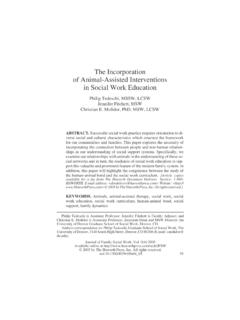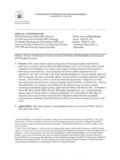Transcription of The Companion Animal Parasite Council Guidelines for ...
1 Guidelines for controlling internal & external ParasitesCompanion Animal Parasite The mission of the CAPC is to foster Animal and human health while preserving the human- Animal bond by generating and disseminating credible, accurate and timely information for the diagnosis, treatment, prevention and control of parasitic Companion Animal Parasite CouncilKnowledge of parasites and Parasite life cycles is essential to controlling them. These Guidelines offer an optimal control program that can be adjusted based on individualized risk assessment according to pet lifestyle factors and local conditions. The Companion Animal Parasite Council (CAPC) is an independent Council of veterinarians and other health care professionals established to create Guidelines for the optimal control of internal and external parasites that threaten the health of pets and people.
2 It brings together broad expertise in parasitology, internal medicine, human health care, public health, veterinary law, private practice and association leadership. For more information about how parasites may affect your pet, please visit us at 2011 Companion Animal Parasite Council . All rights reserved. 2/11 CAPC Platinum SponsorsCAPC Gold SponsorsBoehringer Ingelheim Vetmedica, LimitedCAPC Silver SponsorsIntervet/Schering-Plough Animal HealthCeva Animal Health, Inc. StatSpinVCA ANTECH Virbac Animal HealthCAPC Guidelines are endorsed internal and external Parasites in Dogs and CatsGeneral GuidelinesParasite control should be guided by veterinarians. Prescribe control programs to local Parasite prevalence and individual pet lifestyle factors.
3 Adapt prevention recommendations to address emerging Parasite threats. Conduct physical examinations at least every six to twelve months or as deemed advisable by your veterinarian. Conduct annual heartworm testing in dogs; test cats prior to placing on preventative and thereafter as indicated by history and physical findings. Conduct fecal examinations two or four times during the first year of life and one to two times per year in adults, depending on patient health and lifestyle pet, All year long. Administer year-round broad-spectrum Parasite control with efficacy against heartworm, intestinal parasites with zoonotic potential, fleas, and ticks. Administer anthelmintic treatment to puppies and kittens starting at two weeks of age repeating every two weeks until regular broad spectrum Parasite control begins.
4 Maintain pregnant and nursing dams on broad-spectrum control lifestyle, Healthy pets, Healthy people. Feed pets cooked or prepared food (not raw diets) and provide fresh, potable water. Cover sandboxes when not in use and protect garden areas from fecal contamination. Pick up feces immediately whenever walking a dog in a public area; remove feces from the backyard environment at least weekly, preferably daily. Keep dogs and cats under control; do not allow roaming. Practice good personal hygiene when handling Animal waste, particularly important for children and other individuals at increased risk. If less than optimal control is practiced. Deworm puppies and kittens starting at two weeks, repeating every two weeks until two months of age, and then monthly until the pet is six months old.
5 Conduct fecal examinations two to four times a year in adult pets, depending on patient health and lifestyle factors, and treat with appropriate information is available on the CAPC Web site ( ) including specific recommendations for individual parasites of clinical importance to dogs, cats and humans: internal Parasites Heartworms Tapeworms Hookworms Whipworms Roundworms Protozoa Babesia Giardia Coccidia Hepatozoon Cryptosporidium Leishmania Cytauxzoon Toxoplasma external Parasites Fleas Ticks Mange mites Lice Also, visit the CAPC Web site, for information, including: Pet health and lifestyle factors Zoonotic disease information Life-long, year-round Life cycles and images of prevention strategies Companion Animal parasites Environmental control Board members Educational materials including diagnostic procedures and training videos






